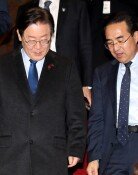Government Changes Course on Welfare
Government Changes Course on Welfare
Posted September. 20, 2006 06:07,
Before the Election: All Praising Swedens Welfare System-
President Roh Moo-hyun, who has often found major state agendas in cases of foreign countries, expressed his interest in the Swedish welfare model by saying in a summit meeting with Swedish Prime Minister Goran Persson in March 2004, I believe Sweden is an amazing country that all Korean people envy and want to learn from.
Deputy Prime Minister and Minister of Finance and Economy Gwon Oh-gyu also suggested in the Swedish Welfare Nation Model and Implications, a report he drew up in December 2005 as Korean Ambassador to the Organization for Economic Cooperation and Development (OECD), We should learn from Sweden. We need to remain a big government and expand our services toward people centering on welfare. President Roh recommended government officials to read the report.
Against this backdrop, the Korean Embassy in Sweden proposed a specific benchmarking strategy in a report that it submitted to Cheong Wa Dae in February 2006, Factors behind the Success of the Swedish Welfare Model.
Calling Sweden a successful case that achieved economic growth and social equality concurrently, the report pointed out that (a) development of future-oriented and proactive welfare ideologies, (b) establishment of institutional devices for resolving conflicts and reaching agreements, and (c) efforts to gain wide-ranging support for welfare policies are needed.
Such a welfare philosophy of the government is fully reflected in the Vision 2030, a report released last month. The Vision 2030 report reiterated, A paradigm shift is needed toward shared growth of economic development and welfare. Especially in the area of welfare, the governments role should be enhanced.
After the Election: We Dont Pursue the Swedish Welfare Model-
After the results of the Swedish general election came out, however, the government began distancing itself from Sweden.
Minister Jang Byung-wan of the Ministry of Planning and Budget (MPB) voluntarily held an emergency press conference in the morning of September 19 and emphasized, The Vision 2030 is not an extreme welfare model of Sweden.
Jang went on to claim, The government is seeking a Korean-style welfare model, instead of a high-burden, high-welfare model like Swedens that puts huge burdens on people. Deputy Prime Minister Gwons view of the Swedish welfare model is not directly related to the Vision 2030, as well. He even said, The Vision 2030 might collapse if it is stigmatized as a Swedish welfare model.
At a similar time of day, Deputy Minister Park Byung-won of the Ministry of Finance and Economy (MOFE) also held an emergency press briefing and stated, If the media reports, Deputy Prime Minister Gwon said Koreas welfare model should go Swedish, this will be incorrect. Korea is not copying the Swedish welfare model.
The MOFE never raised any objection, however, when the media extensively covered Gwons view of the Swedish welfare model in July 2006.
Such a dramatic change in the governments position is interpreted as a move to avoid criticismin the face of major issues such as the Vision 2030, whose focus is on strengthening the welfare sector, and settlement of next years budget billover why it is copying a model that failed.
ddr@donga.com







